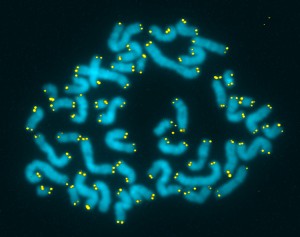We all know that a good diet, less stress and more exercise helps avoid major diseases such as atherosclerosis, diabetes and even cancer. However, it seems that treating our bodies right doesn’t just work at the macro level – it works on individual cells as well.
A joint study by the US Department of Defense, the US National Cancer Institute and the Prostate Cancer Foundation looked at 35 men who had early-stage prostate cancer. Specifically, it examined how changes in their lifestyle affected how young their cells appear to be.
To do this, the study looked at the length of telomeres in the men’s cells. Telomeres are located in the cell nucleus and form a cap on the end of chromosomes, protecting them from damage. Every time that the cell divides, the telomeres become a little shorter, so the length of telomeres is a good indication of just how old a cell is – this fact is often used in clinical research.
Telomere length isn’t just an artificial measurement of cell age. There has been significant evidence discovered that shorter telomeres are correlated with a number of diseases that we get as we age, including cardiovascular disease and some specific cancers. It is thought that as telomeres become shorter, they offer less protection to chromosomes, and so the chromosomes become less stable. This in turn leads to chromosome damage, which results in the age-related diseases that are seen.
Of the 35 men in the study, 10 were asked to make specific lifestyle changes, whereas the other 25 were not given any guidance. The changes that the 10 men made included eating a plant-based diet that was high in vegetables, fruits and unprocessed grains, and low in refined carbohydrates and fat. They were also asked to take moderate exercise – a daily 30 minute walk – reduce stress, and go to a weekly support meet.
The study then monitored the men for five years and, even though it was only a small pilot study, it delivered some potentially significant results. It turned out that among the 10 men who made major lifestyle changes, the length of their telomeres actually increased by 10% on average – in other words, their cells actually seem to get younger, rather than the aging process just slowing down. On the other hand, those who didn’t make any lifestyle changes actually saw an average 3% decrease in telomere length.

The researchers are cautious about making too many claims at this point, and are not willing to say there is a direct cause and effect. They believe that larger randomized controlled trials would be needed for the result to be confirmed, but think this is worth doing. Even if the dramatic lifestyle changes turn out to have the anti-aging effect that they apparently did in the study, the problem remains – how can a population as a whole can be motivated to change their lifestyle? This is exactly the same challenge we face today when it comes to convincing people to get sufficient exercise and follow a healthy diet.
Healthy Living Keeps Your Cells Young

No comments:
Post a Comment